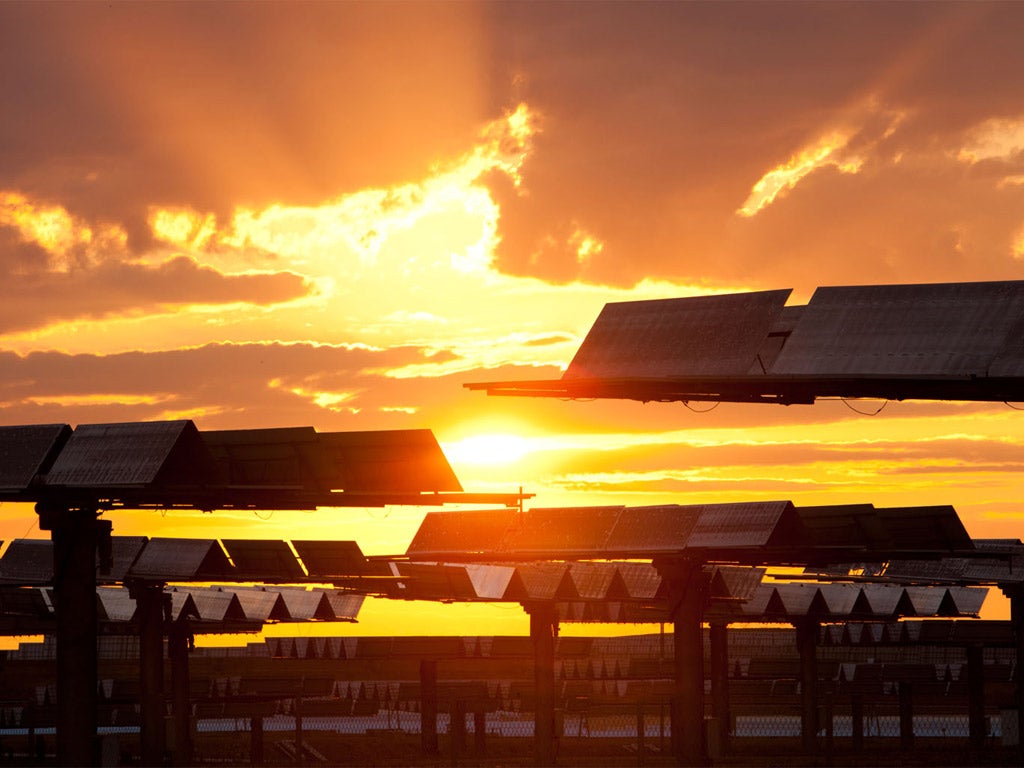Ministers feel the heat over solar energy cuts
The slashing of the feed-in tariff for solar power has been ruled unlawful; today MPs claim the plans could be 'fatal' to the industry

Another day, another challenge to the Government's solar power subsidy cut. Yesterday the High Court joined the queue of opponents to the move, ruling the hastily introduced slashing of the so-called feed-in-tariff for solar power to be "legally flawed".
Today, two influential cross-party committees of MPs will jointly condemn the move, arguing that it not only threatens Britain's fledgling solar power industry, but the development of its entire renewable energy sector.
The latest double whammy of condemnation adds to a chorus of opposition from environmentalists, consumers, MPs, the European Commission, the solar power sector and industry at large. While the emphasis of their bugbears may vary slightly, most are united in their view that the halving of the solar power tariff – to 21p per kWh – was too drastic and rushed through far too quickly.
Yesterday's High Court ruling is expected to see the subsidy cut postponed by weeks – and possibly softened – as the consultation process begins all over again. However, the Department of Energy and Climate Change (DECC) is digging its heels in, meaning the changes may still go ahead as planned. "We disagree with the court's decision. We will be seeking an appeal and hope to secure a hearing as soon as possible," a spokesman said.
The case, brought by Friends of the Earth and two solar power firms, hinged on the Government's decision to rush through the subsidy cut, announcing it on 31 October and implementing it just six weeks later – on Monday last week, 11 days before the consultation period officially ends on Friday. And whatever its eventual outcome, it doesn't make the Government look good.
But that was yesterday. In a report today, based on evidence from more than 60 key players with a wide variety of connections to Britain's renewable industry, the Energy and Climate Change Committee (ECC) will paint a picture of a Government that is slow-moving, disorganised and prone to panic. As is the vogue, the report, compiled jointly with the Environmental Audit Committee (EAC), will condemn the Government's sudden decision to rush through the subsidy cut.
It will argue that the cut – together with a proposal that most households would need to invest heavily to better insulate their houses to be eligible for the subsidy – "was based upon an inadequate impact assessment and unfairly set a 12 December deadline for changes to come into effect".
The proposal that participating households invest more to insulate their homes – which could require as many as 9 out of 10 households to spend between £5,000 and £14,000 to comply – "could have a fatal impact on the take-up of the scheme after 2012," according to the report.
Tim Yeo, the ECC chairman, said: "The consequence of the rushed, eleventh-hour consultation will be uncertainty among investors in all kinds of renewable energy, which will inevitably push up the cost of capital. The Government should build predictability into its energy policies and then stick to it. In Germany and France they have regular, incremental reviews and long lead times before changes are made."
Mr Yeo added that "this is an extremely unfortunate outcome" as Britain needs to replace its ageing fossil-fuelled plants with cleaner alternatives, such as wind, solar and nuclear over the next decade – at an estimated cost of £200bn.
As if to underline the scale of the task of switching to renewable energy, BP yesterday shut down the remaining parts of its solar power business, saying that it "can't make any money" from selling panels. The closure of the business, which was too large to receive an FIT subsidy, is only the latest in a series of such operations to close in recent months.
The report recognises that solar power subsidies need to come down, as a 40 per cent decline in the price of solar panels in the 18 months since the FIT scheme was introduced have contributed to a much higher than expected take-up of the so-called feed-in-tariff scheme. But ministers knew that the take-up of the scheme was unsustainable as early as March and should have reduced the subsidy much earlier, in a "more orderly way" and over a longer period of time, argues Mr Yeo.
October's subsidy cut – the third change to solar power subsidies in four months and coming after George Osborne unexpectedly hiked taxes on North Sea oil by £2bn in the Budget – has cemented the Government's reputation as "moving the goalposts".
John Cridland, the director general of the CBI, noted in a speech last month that "moving the goalposts doesn't just destroy projects and jobs, it creates a mood of uncertainty that puts off investors and they wonder what's coming next.... Industry trust and confidence in Government has evaporated. This bodes poorly for investment in future initiatives."
The Solar Trade Association estimates that between 18,000 and 29,000 of the UK solar industry's 30,000 jobs are threatened by the subsidy cuts, along with up to £230m of annual tax revenues.
The report notes: "Our inquiry exposed a lack of co-ordination between the Treasury and DECC." Maybe a greater degree of integration would slow the process down to the benefit of all concerned.
Join our commenting forum
Join thought-provoking conversations, follow other Independent readers and see their replies
Comments
Bookmark popover
Removed from bookmarks